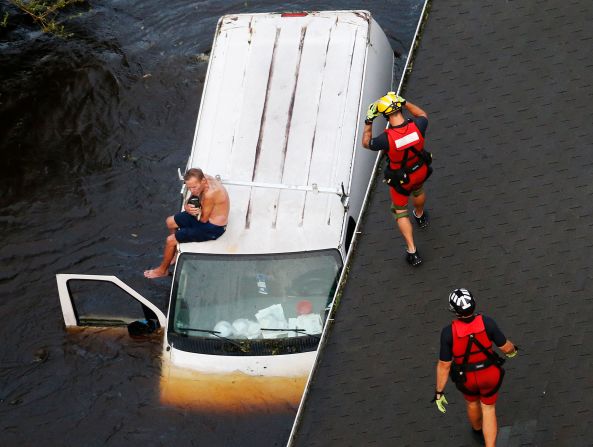Editor’s Note: Jill Filipovic is a journalist based in New York and Nairobi, Kenya, and the author of the book “The H-Spot: The Feminist Pursuit of Happiness.” Follow her on Twitter. The opinions expressed in this commentary are solely those of the author. View more opinion articles on CNN.
Hurricane Florence is bearing down on the Atlantic Coast, and officials are scrambling to keep people safe and avoid loss of life. In North Carolina, South Carolina, and Virginia, coastal residents have been told to seek safer ground away from flooding; in several counties, the evacuations are mandatory. Officials expect more than a million people to heed their warnings and leave their homes by the time the storm makes landfall .

As people race away from the coast, many making the ghastly calculation of what to put in the car, what to do if their home is destroyed, and how many artifacts of their lives may be lost, the rest of us – and certainly those who hold political power – need to heed the urgent message of Florence: climate change is real and we need long-term solutions.
Having longtime emergency response plans in place is great. But changing weather patterns, rising sea levels and receding coastlines mean that this won’t be enough: these emergencies are going to come more often, and they are going to be more devastating. Florence, for example, is projected to near Category 5 status as it approaches warm coastal waters. By comparison, Hurricane Katrina, in 2005, was a Category 3 storm whose profound effects – and numerous deaths – came from a storm surge.
Last year’s Harvey was a 4 before it was quickly downgraded, but nonetheless dumped a catastrophic rainfall – nearly 50 inches – over tens of thousands of homes, largely uninsured against flood damage.
Our elected officials need to be leading the charge on how the nation’s most vulnerable areas will plan to deal with the reality that has arrived – it is right before our eyes.
Disaster prevention, and not just relief, needs to be a government obligation. That means making the tough calculation that certain parts of the country may be in areas that are beyond saving; people should be assisted in moving to safer locales.
It also means investing in the necessary infrastructure to keep a significant weather event from turning into a deadly disaster. This is a long-term project, and an expensive one; it won’t necessarily drive people to the polls, but it’s the right and necessary thing to do. We are talking big-ticket engineering feats – sea walls, elevated roads and other infrastructure, vastly improved drainage systems and on and on – and also tightened up building codes. It has been done in some places. It needs to be done in every vulnerable locale.
Companies that are leading polluters have long benefited from American corporate welfare, and now regular Americans all pay the price. These companies should shoulder a much bigger part of the burden by paying their fair share of taxes, and being held significantly financially accountable if they violate environmental regulations (this is of course assuming we have even marginally decent environmental regulations to begin with).
But this kind of building and planning is tough to do when one of our two major political parties denies that climate change even exists – or, if it does recognize it may be a real thing, essentially shrugs it off because actually doing anything would be costly to big business.
The result is that the necessary and terrifyingly overdue efforts to combat climate change at the source are simply not being made in the United States; in fact, even small victories, such as efforts to stem pollution from coal, and US participation in the Paris climate change accord, are being walked back. The Federal Emergency Management Agency says it’s ready for this storm, but its showing in Puerto Rico when Maria hit doesn’t exactly earn it any confidence.
Insurance companies have filled in some of the gaps left by inadequate government support in recovery, but they aren’t exactly benevolent actors serving the public equally: they’re money-making forces, and they help only a few.
In pictures: Hurricane Florence and its aftermath
Like nearly everything else in America, the bad outcomes of this setup fall along racial and class lines, borne disproportionately by those who already have the fewest resources. People who are wealthy or even stable and middle class can afford to think ahead and buy insurance for their homes; those who live month to month – a vast swath of the American population – may not be able to afford it. Or, more likely, they may be renting a place to begin with and will find themselves homeless after a storm.
And those without reliable transportation will have a harder time fleeing; if they do manage to leave, they’re less likely to be driving their own vehicle, which means leaving more of their possessions behind. Imagine what this is like.
Those with the power of education, money and time can navigate insurance bureaucracies to ensure they are made something close to whole when the waters recede. Those who don’t have those privileges will inevitably lose out.
Just look at the effort already under way to evacuate coastal regions ahead of Florence, and compare it with the treatment of people in Puerto Rico, which is part of the United States, and which was devastated by a hurricane a year ago this month. Thousands of Americans died, and it’s telling that we aren’t even sure of how many – maybe 3,000, maybe 4,000.
Some government cleanup and assistance contracts there wound up as corporate handouts to friends of the administration. Because of this hostile neglect, the island isn’t even close to recovering.
These hodge-podge emergency response efforts, bolstered by private insurance and helping a lucky few, are vastly inadequate strategies for dealing with what is unquestionably a bleak and disaster-pocked future – for everyone in America.
We can’t turn back the clock. But we must get ahead of what’s coming – and if Republicans aren’t going to do it, it’s imperative to vote them out of office and demand that Democrats take immediate action.









































































